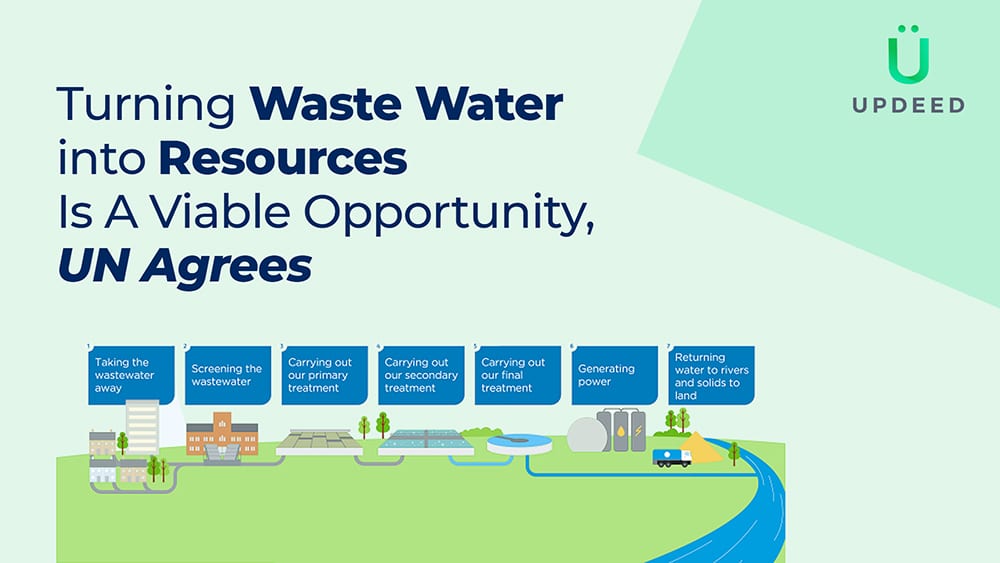Turning Waste Water into Resources Is A Viable Opportunity, UN Agrees
Wastewater, a once-overlooked byproduct of human activity, is stepping into the spotlight as a potential game-changer in addressing some of the world’s most pressing environmental challenges.
A recent analysis published by the UN Environment Programme (UNEP) and GRID-Arendal, in collaboration with the Global Wastewater Initiative (GWWI), has brought the transformative possibilities within wastewater to the fore. This unassuming substance, often seen as a health and environmental threat, has the potential to not only mitigate its negative impacts but also contribute positively to energy, water, and fertiliser needs on a global scale.
The report, Wastewater. Turning problems into solutions urges governments and businesses to treat wastewater as a circular economy opportunity rather than a problem to be disposed of. There are multiple benefits for effectively collecting, treating, and reusing wastewater – including new jobs and revenue streams. Additional advantages would result from reducing the volume of wastewater produced.

Change in approach to managing wastewater
The analysis’s revelation that wastewater is responsible for emissions nearly equivalent to those of the aviation industry underscores the urgency of rethinking our approach to wastewater management.
The environmental consequences of unchecked wastewater disposal are clear, from contamination of water bodies to greenhouse gas emissions. However, the report doesn’t just paint a bleak picture; it presents a hopeful narrative of what could be achieved with the right strategies.
One of the most intriguing prospects highlighted is wastewater’s potential to become an alternative energy source for a substantial portion of the global population. With innovative technologies and supportive policies, wastewater could emerge as a reliable energy source, potentially meeting the needs of millions lacking access to conventional energy sources. This dual benefit – solving wastewater issues while addressing energy poverty – could be a turning point in sustainable development.
Wastewater a boon
Furthermore, the analysis points to wastewater’s remarkable potential in water resource management. By supplying over ten times the water currently produced by global desalination facilities, wastewater could be a key player in tackling the growing problem of water scarcity.
As water demand continues to rise alongside population growth, utilising wastewater as a supplementary water source offers a sustainable solution that doesn’t deplete freshwater reserves.
Equally significant is wastewater’s potential role in mitigating the excessive use of fertilisers in agriculture. The report suggests we could offset more than 10% of global fertiliser use by repurposing wastewater as a nutrient-rich fertiliser source. This has the dual benefit of reducing the pollution caused by excessive fertiliser application and conserving the resources required for their production.
The collaborative effort between UNEP, GRID-Arendal, and the Global Wastewater Initiative signals a resolute commitment to exploring and promoting these transformative possibilities. These organisations are paving the way for innovative solutions to wastewater-related challenges by combining their expertise, resources, and networks.
The initiative extends its focus to a multi-pronged approach. Technological innovations play a pivotal role as researchers and engineers work to unlock the potential of wastewater as a resource. The quest for efficiency, sustainability, and scalability is at the forefront of these efforts, from advanced treatment methods to energy generation technologies.
Collaboration holds the key
However, transforming wastewater’s perception and utility is not solely technological. Policy frameworks are equally crucial in incentivising and regulating responsible wastewater management practices. Governments, industries, and communities must collaborate to create an environment where the transition from pollution to resource is feasible and economically and socially viable.
The recent analysis by UNEP, GRID-Arendal, and the Global Wastewater Initiative unveils a future where wastewater takes on a new identity – that of a valuable resource with the potential to drive sustainable development. While the challenges posed by wastewater are significant, its opportunities are equally transformative.
From addressing energy poverty and water scarcity to curbing fertiliser excesses, the journey from pollution to resource is well underway. Through continued research, innovation, and collaboration, we have the chance to redefine our relationship with wastewater and embrace it as a catalyst for positive change on a global scale.
Ready to make a positive impact in the world?
UPDEED is the place for you. Our free and open platform is filled with inspiring stories from individuals and organizations who are making a difference in their communities and beyond. Connect and collaborate with like-minded individuals from around the globe on UPDEED, and discover your own potential to create meaningful change. Join our community and make a difference.





